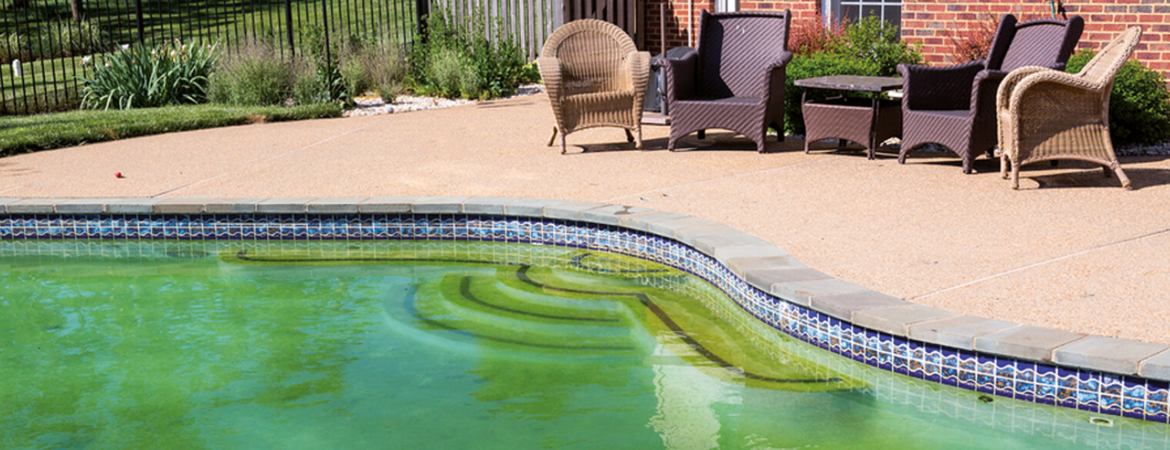Main ideas of this article
- Phosphate encourage algae growth in the water
- Phosphate and Calcium balance in pool water
- Why Calcium hardness should be kept in a range
- How to test Phosphates and Calcium Hardness
- Lovibond® products for pool
Products: Phosphate Test Kit, Minikit, 5in1 Multi Pooltester
Do you have green and/or cloudy pool water? You could have an algae growth, a common problem for many pool owners. Algae is more likely to grow in sunlight, warm temperatures, low chlorine levels, and at high phosphate levels. Phosphate have the potential to feed and encourage algae growth in your swimming pool. If algae growth an be avoided, it safes a lot of effort and money.
Key parameters — Phosphate + Calcium Hardness
Phosphate levels in pool water below 150 ppb (0,15 ppm) is acceptable, but once you start to get higher than 500 ppb (0,5 ppm), it is time to start actions to reduce. The ideal Calcium Hardness in pool water is around 200 mg/l CaCO3.
If algae growth has happened
Brush the algae off of the walls and floor. Clean the filter, then shock the pool with chlorine. After that, add the phosphate remover. Keep in mind that phosphate remover is hard on the filter, and you will notice reduced ow after a day or two. Clean the filter again after 24 to 36 hours of circulation.
Why measure Calcium Hardness in Pool water?
Hard water > 300 mg/l as CaCO3 may cause scaling of pool and spa surface, scaling of pool tile, rough pool surfaces, clogged filter heater, pipes and causes cloudy water. Soft water < 50 mg/l as CaCO3 may cause problems in swimming pools as it will have a ”calcium demand” and seek out calcium from the pool structure. Best might be around 200 mg/l as CaCO3.
How to measure Calcium Hardness in pool water
Instrument: Minikit
The Lovibond® Minikit AF 445 is user-friendly and provides fast and accurate test results. Foil-wrapped Lovibond tablet reagents are easy to take, with a minimum guaranteed shelf life of 5 years. Minikit contains two plastic shaker tube, one with low test range 20-200 mg/l (CaCO3) and the other with high test range 80-800 mg/l (CaCO3).
Method
- Rinse the sample container with the water sample, leaving a few drops at the bottom.
- Add one tablet and allow to disintegrate completely. A violet colour will be produced. (Colour may be different)
- Gradually fill the tube with the sample until the colour changes from violet to orange. Swirl the tube gently during addition to ensure mixing and be careful not to overshoot the colour change.
- The total hardness is given by reading the graduation corresponding to the water level in the tube.
Lovibond® 5in1 Multi Pooltester:
- pH 6.8 - 8.2 pH
- Calcium Hardness 20 - 800 mg/l CaCO3
- Alkalinity 20 - 800 mg/l CaCO3
- Chlorine 0.1 - 3.0 mg/l Cl2
- (Free/Total/Combined)
- Cyanuric Acid 20 - 200 mg/l CyA
The Multi Pooltester is designed for the simultaneous determination of the most popular water treatment agent chlorine (free, combined, total) and the pH value. Additionally the Multi Pooltester allows the determination of cyanuric acid, total alkalinity and calcium hardness, based on the Minikit methods.
How to measure Phosphate in Pool water
Instrument: comparator
The important range is 0 to 1000 ppb (0-1 ppm). Lovibond® Phosphate test kit is fast, simple to do, and affordable.
Advantages
- Tablets, no dosing error and long shelf life.
- Measurement range: 0 to 1000 ppb (0-1 ppm).
- NON DANGEROUS reagents.
- A simple visual colour comparison.
- Test kit with 30 tablets each.
- Measurement time 5 minutes.
Method
- 1+2 Add tablet reagents No. 1 and No. 2 to empty vial.
- 3 Fill vial completely with sample.
- 4 Crush tablets by twisting the stirring rod. Spill over of a bit sample while immersing the rod is normal and leads to a denfined volume in the vial.
- 5 Sway vial until tablets are completely dissolved.
- 6+7 After 5 minutes compare colour with colour card and get result.
- 8 Rinse vial and stopper with drinking water.
Lovibond® Apps
AquaLX and PoolM8
The Lovibond® App, AquaLX®, enables the immediate review, process and evaluation of measured results directly on-site. Data trends can be monitored with easy-to-view graphical displays with set minimum and maximum values.
Any fluctuation to expected results is immediately visible and instant action can be taken.
Furthermore, additional personalised information, like sample takers or place of sampling can be added. Records can be transferred at the touch of a button by email either as a graphic or database record, simplifying the transfer, management and sharing of results.
AquaLX® compliments the Langelier Index App, PoolM8, which negates the need for complex calculations for Balanced Water. By simply entering the results of the parameters (pH; Total Alkalinity; Calcium Hardness; Total Dissolved Solid; Temperature), the App automatically determines and displays the results which can then be saved to create a history and, again, shared via email.
